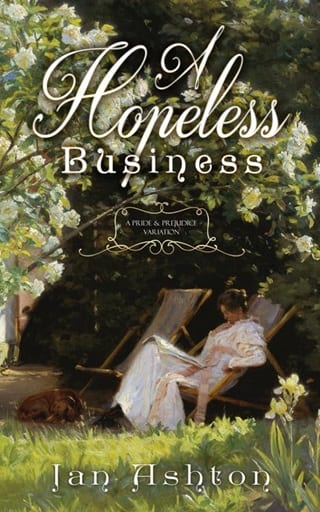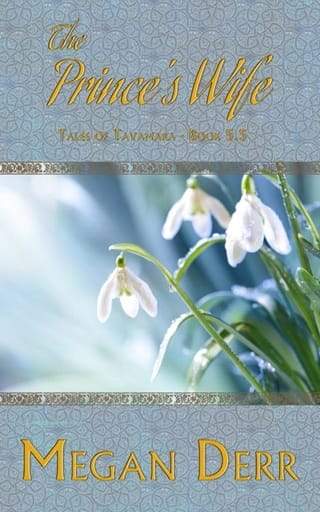Chapter 26
CHAPTER TWENTY-SIX
I n the past, hardly a day would go by without Elizabeth visiting Mr Bennet in his book-room. It had been her place to escape the cacophony of her mother and sisters, a place to talk sensibly of the news and history, to laugh at the neighbours, or glean what she could of Longbourn's daily business. That habit had ended in February with Mr Nugent's failed proposal, and in spite of the warmth in her father's expression upon her arrival home, Elizabeth had no intention of resuming it. It mattered little, for after supper, as she went to join her sisters in the music room so Mary could show off her newest accomplishment, Mr Bennet beckoned her to join him.
Her spirits fell. She surprised herself with the resentment she still felt; receiving his sole letter in two months only days ago, compounded by Mr Collins' scheming, and the unrelenting disturbance she felt over Mr Darcy made it difficult for her to view her father with any equanimity. She followed him to the room, smelled its familiar smells, sat across from him in the smaller chair by the fire, and waited for him to speak.
"We have missed you here, Lizzy."
"I have missed my home."
Perhaps it was the lack of warmth in her reply which led him to alter his tone. "I hope you enjoyed your time away. Sir William tells me Mr Darcy was there at Rosings. Mr Collins supplied me with letters to the same. Your letters did not make mention of him."
She startled, astonished less to learn Mr Collins was supplying him reports of her visit than she was that she would be questioned about their veracity. "Was it of interest to you?"
Frowning, he asked, "Did he repeat his offer to you? The offer of marriage he made to me for you, in case your reputation was irreparably damaged after what occurred in November?"
Mr Darcy had offered for her? Then? And she had not been informed?
Swallowing her shock, she shook her head. "No," she replied coolly. It was not a lie if she had not known he was repeating himself. "He did not. I was not aware such an offer had been extended, and am surprised you did not accept on my behalf."
"You had yet to meet and refuse Mr Nugent. Had I known you would make a habit of despising your suitors, I would have done so, but at the time, knowing your dislike of Mr Darcy and regardless of the assistance he provided to you and Mr Collins, I could not tie you to him."
He looked smugly at her as if she should be grateful for his paternal interference; she closed her eyes and saw the image of Mr Darcy's pained expression. In November, he had made a principled offer she would have declined—had she known of it—but she would have been honoured by it nevertheless. Did her ignorance of it affect how she thought of him afterwards? Did it affect how she would have heard his impulsive but heartfelt proposal made two days ago?
"And now you return to us as you were, but with two sisters who have been busy disappointing their parents." He sighed, she thought, rather dramatically.
Elizabeth was proud of Kitty for recognising Mr Nugent's true character, and pleased for Mary, for understanding a budding curate needed a position before taking a wife; Mr Smith was likely to return to court her. Her opinions, however, only seemed to vex her father.
"Once upon a time, you and Jane were my sensible daughters. She retains that title and my esteem, but you, Elizabeth? Have you truly returned home from two months in London and Kent and met not one man worthy of becoming your husband?"
I have, I have! But I told him I would not have him!
His mocking expression deserved neither full honesty nor sincerity. "Papa, I am sorry you are disappointed I have returned to you as I left, unattached even with your threat of automatic betrothal hanging about my head." She raised an eyebrow to match his. "You may apply to Mr Collins if you wish to know about the marriage to a tenant farmer he wished to force on me, but I hope you will think me sensible for that refusal."
Jane's engagement, and Elizabeth's time apart from her sister, had changed her. She remained blissfully in love with Mr Bingley, of course, but in between their conversations about him, the wedding, and goings-on at Longbourn, Elizabeth saw that her sister showed a deeper understanding of love, which allowed her to see that Elizabeth's heart was touched.
She had spoken more freely—and far more warmly—about Mr Darcy than she had about any other man, suitor, or neighbour of their acquaintance, giving Jane surety that Mr Darcy could have no reason to propose to a girl lacking fortune and connexions unless there was strong feeling behind it. That afternoon, sitting on Jane's bed and watching her sister choose which gowns and bonnets she would leave at Longbourn for her sisters, Elizabeth hoped to be persuaded Jane was correct.
"Pink sets off Kitty's light hair, but she prefers blue," Jane fretted. "And Lydia always wants to wear pink, when green suits her better."
"Hmm."
Elizabeth's disinterest caught her sister's attention, and Jane turned round, looking abashed. "What did you say to Mr Darcy?"
"I said I could not accept his offer if he made one."
"You will not marry him because you are being honourable or because you do not feel the same?"
"Because he is being honourable."
"Or perhaps he loves you. He could marry anyone but he has stood by you." Jane took Elizabeth's hand, then sat beside her. "You say he did not actually propose?"
"He could not...he said he would not, because he knew of Papa's ultimatum and would not force me to marry him or to prevaricate to Papa that I had received no proposals while in Kent. I did not know he had offered to marry me last November if gossip began and my reputation was at risk." The depth of his feelings, of his respect for her situation, suddenly overwhelmed her. Elizabeth felt her eyes misting and turned away to gain control of herself.
She had spent too many hours in the carriage ride from Kent mulling over the compliments Mr Darcy had paid her and recalling his troubled frown when she asked him to refrain from proposing. Colonel Fitzwilliam had worn a similar expression when he climbed into the carriage with her and Maria and chattered away about the sights outside and the glories of the fish pie served at the inn in Bromley, where he said they often stopped on their journeys to and from Rosings. She flipped through the pages of her book while he gave her curious looks but gratefully did not press her for conversation nor make his usual teasing comments about Mr Darcy, who rode silently beside the carriage for the entire journey.
"Oh Lizzy! Mr Bingley has nothing but praise for Mr Darcy—he is the best of men, the greatest friend." Jane shook her head. "I knew nothing of what he said to Papa, of course, but how did Mr Darcy learn of the ultimatum?"
Elizabeth hesitated; here was a subject she wished to avoid, but she could not prevaricate nor hide truth from Jane. "Miss Bingley called on him in London before he went to Kent and told him about my refusal of Mr Nugent's proposal. Whether she knew I was to be in Kent as well, I do not know, but she was intent on warning him about my scheming ways."
"Oh. "
"I am sorry, Jane. It is...she is?—"
"She is rather awful, I know. Petty and jealous and unable to think of the happiness of others." Jane gave a little shake as if gathering her thoughts and then looked at Elizabeth with a pained expression. "I am perceptive about people, Lizzy, but prefer to speak only of the good I see in them. Miss Bingley challenges me in that habit and reminds me again how fortunate I am to have a sister as dear as you."
"A sister who will speak her own unkind thoughts aloud with no hesitation? Oh dear, I am likened to Miss Bingley?" Elizabeth laughed. How good it felt to laugh, not to think about her travails of the past months or of what lay ahead.
Jane sighed in that way she had that conveyed genuine affection and concern. "Lizzy, it is not easy to know your own heart, let alone that of a man who affects you."
"Men are such puzzling creatures. They act as if they are the soundest, most intelligent creatures in the world but I seem to attract insensible ones. Mr Nugent wished less for a wife than for a sister to attend his mother, and Mr Collins professed himself bewitched by three women in mere weeks! Neither had the merest notion that marriage to a woman as unwilling as I could not possibly produce a happy union."
"Only Mr Darcy appears to have acted with any logic, or passion, or respect for your situation."
"To rescue me."
Jane returned to the closet and held up a yellow gown to herself before setting it on the chair with the others. "I believe there is far more to his efforts, Lizzy. To offer for you once, based on your honour, and then to refrain from proposing so as not to force you to accept? That is more than goodness and respect. It is love."
Was it true? Mr Darcy had no other reason to propose to a girl such as herself—poor, without connexions, often sharp-tongued, and too bent on refusals—unless there was strong feeling behind it. Strong feeling in a quiet man is far preferable to the flowery declarations from a nattering dandy or fool.
She remembered the previous October, and Jane's delight upon learning that Mr Bingley shared her preferences for blackberry jam and Stilton cheese. She was eager to know everything of his likes and dislikes, of which there were very few, as his—like her own—was a most agreeable temperament.
Tastes and common preferences did not mean love, but Mr Nugent thought so; he recalled hers and proudly recited them as if her partiality to fruit tarts over meringues was a sonnet. She had never paid attention to how he liked his fish or eggs. But she knew how Mr Darcy took his coffee and the way he had of drumming his thumb on his leg or a chair arm when impatient. She knew he disliked mutton, that he bit his lip when reluctant to smile in company, and only carried handkerchiefs his sister had decorated. If it was not love when Mr Nugent catalogued her preferences, what was it that she noticed so much about Mr Darcy?
Perhaps it was the way their minds seemed so well-matched. Her acquaintance with gentlemen outside of those she had known all her life was small but it had grown this past year, and only with Mr Darcy had she found such an admirable combination of generosity, intelligence, curiosity, and devotion to duty. It seemed too dull to fully describe all she had come to esteem in him. He is handsome and clever and smells good, too.
"These, I think," Jane said, examining the last three gowns—two pink, one blue—in her closet. "And of course, my meadow-green gown for you, Lizzy. It captures your eyes so perfectly."
Elizabeth nodded. "And the three inches of hem that must be cut off will be perfect for trimming whatever Mary has ready in her remnant basket."
Jane smiled. "Lizzy, you have a kind heart and if you give it, I wish it to be to a man you can love as I do Mr Bingley. You seem so uncertain of your feelings for Mr Darcy, and if you do not reciprocate his love, you must tell him. Then, perhaps, you will feel able to meet a man better suited to you than Mr Darcy."
There is no man better suited for me than Mr Darcy. She could not reveal to Jane what she would scarcely admit to herself. Not only was she in love with Mr Darcy, but after all she had said to him about her satisfaction in refusing other men, he would not dare ask her again.
I shall have to ask him.
 Fullepub
Fullepub 



